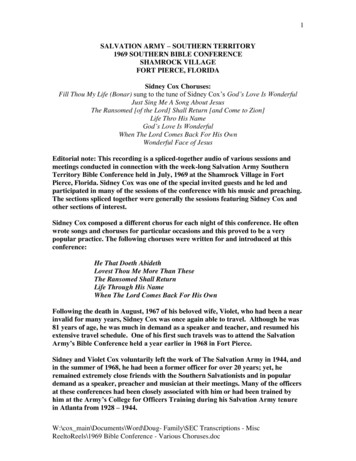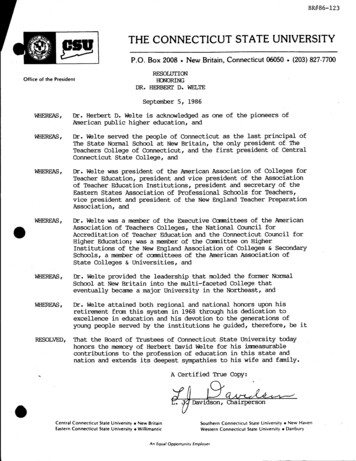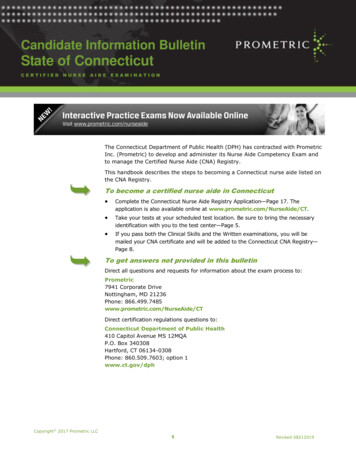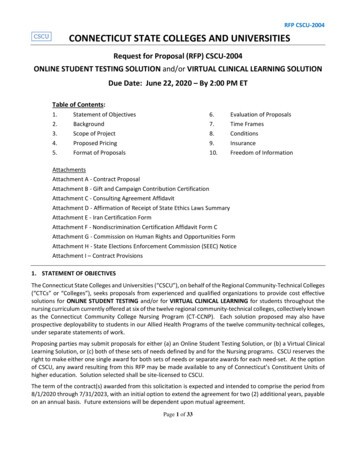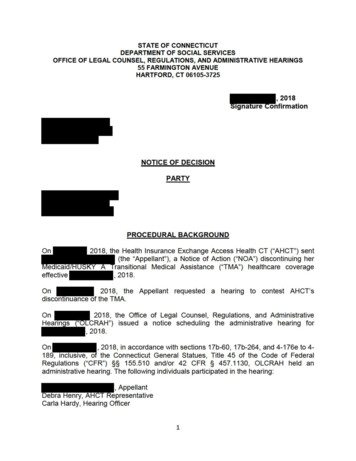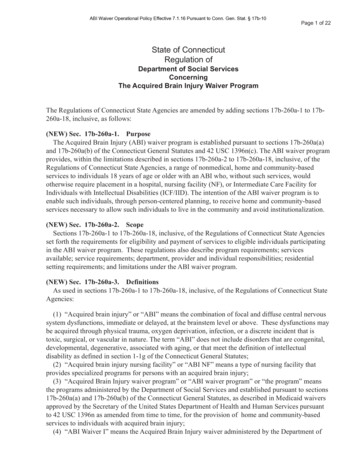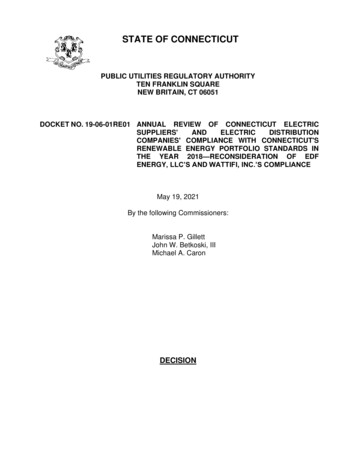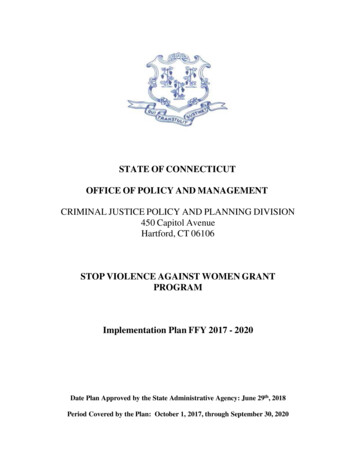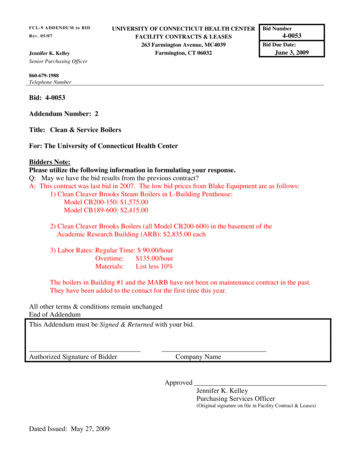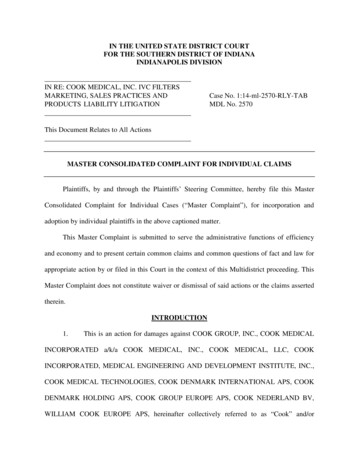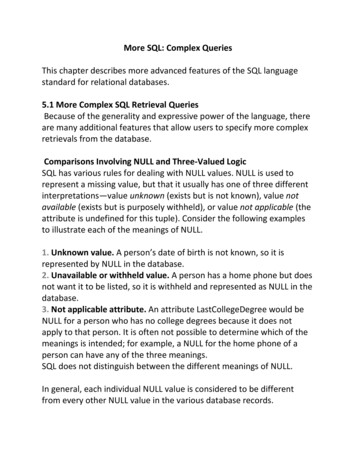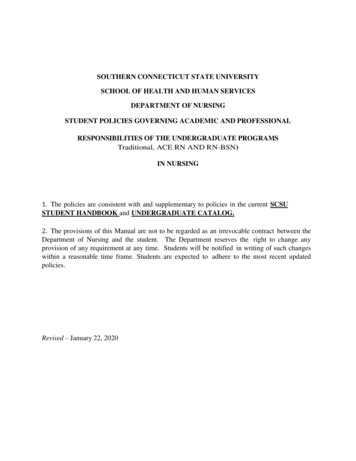
Transcription
SOUTHERN CONNECTICUT STATE UNIVERSITYSCHOOL OF HEALTH AND HUMAN SERVICESDEPARTMENT OF NURSINGSTUDENT POLICIES GOVERNING ACADEMIC AND PROFESSIONALRESPONSIBILITIES OF THE UNDERGRADUATE PROGRAMSTraditional, ACE RN AND RN-BSN)IN NURSING1. The policies are consistent with and supplementary to policies in the current SCSUSTUDENT HANDBOOK and UNDERGRADUATE CATALOG.2. The provisions of this Manual are not to be regarded as an irrevocable contract between theDepartment of Nursing and the student. The Department reserves the right to change anyprovision of any requirement at any time. Students will be notified in writing of such changeswithin a reasonable time frame. Students are expected to adhere to the most recent updatedpolicies.Revised – January 22, 2020
BSN PROGRAM OUTCOMES1. Incorporates theoretical concepts and foundational knowledge from liberal education toguide nursing practice.2. Integrate current best evidence and professional standards into nursing practice withconsideration of clinical expertise and patient preferences and values.3. Apply leadership and management principles to achieve quality and safetyoutcomes.4. Demonstrate responsiveness to the larger contest of the healthcare system regardingregulatory, financial, and political factors that influence the quality and value of care.5. Function effectively within nursing and interprofessional teams to foster opencommunication, collaboration, mutual respect, and shared decision-making.6. Provide patient-centered care that recognizes individual and/or family preferences,values, and needs, respecting patients and families as full partners in care.7. Promote individual and population health, wellness, and disease prevention atthe global/local level.8. Use information and technology to provide care, communicate, educate, manageknowledge, prevent error, and make critical decisions that optimize patient outcomes.9. Demonstrate behaviors consistent with social justice, legal and ethical accountability,and professional codes and standards.10. Minimize risk of harm to patients, providers, and the public through continuousimprovement in both system effectiveness and individual performance.(Revised and approved on 5/18/2017)2
Southern Connecticut State UniversitySchool of Health & Human ServicesDepartment of NursingPhilosophyBasis for PhilosophyNursing is a practice discipline based on a specialized body of knowledge. The knowledgebase continues to evolve through qualitative and quantitative research, which are both,valued as a foundation for practice. The essentials of baccalaureate and master’s educationas described by the AACN (2008) provide the organizing framework for the curriculum.Baccalaureate nursing education is enriched by integrating knowledge from the liberal artsand sciences, which prepares students for study in the major. Graduates of the baccalaureateprogram are prepared to assume beginning level professional nurse positions in a variety ofhealth care settings. In their professional nursing practice, they will be able to address theneed for outcome-oriented andpatient-sensitive health care.The graduate program enables students to acquire advanced knowledge and expertise in thespecialized roles of nurse educator and clinical nursing leader. The Graduate Program buildson the competencies of baccalaureate graduates. The Graduate Program is committed to thedevelopment of the nursing body of knowledge through research and academic and clinicalscholarship. Graduates of the master’s program are prepared to assume leadership roles innursing and health care, participate in health care design and public policy formation,provide leadership in the management of resources (human, physical and fiscal), andcontribute to the advancement of the profession through research.3
NursingNursing is an art and a science that serves humanity. As a practice discipline, nursing isbased on a defined knowledge base developed through the integration of theory and practice.The values embraced by professional nursing include: altruism, autonomy, human dignity,integrity, and social justice. While providing care to a community of interest, professionalnurses are accountable for safe practice based on current research, legal and ethical guidelines,and accepted nursing standards.At the baccalaureate level, theories and concepts drawn from nursing, related sciences andliberal education are used to develop holistic approaches to care. Nursing interventions areimplemented in a culture of caring and involve interactive partnerships. Within thesepartnerships, students are expected to utilize the professional and therapeutic self todiagnose human responses and to respond to human needs. Through the nursing process,professional nurses interact with persons in their care to foster the holistic integrity of theirfamily, community, and global position. The experience of interacting with personschanges the nurse as well as the person. Professional nursing, which works within amultidisciplinary team, manifests itself in several roles. At the baccalaureate level theseroles include, coordinator and designer of care, clinical provider, manager of services andresources, member of a professional discipline, and advocate for health care standards.In addition to baccalaureate level competencies, the graduate student develops skills incritiquing, applying, and evaluating a range of nursing and related theories and concepts todevelop holistic approaches to care. At the MSN level, outcomes of nursing interventionsare analyzed to initiate, change, and improve practice. The roles of advocate for consumerand the nursing profession, change agent within the health care system, manager of systems,and consultant, are incorporated into advanced practice.Additionally, family nurse practitioners provide care that includes accountability for healthpromotion, assessment, diagnosis, and management of client problems including prescriptionof pharmacologic agents.PersonThe Department of Nursing believes that all persons are multidimensional with diversecultural, spiritual, and socioeconomic backgrounds and deserve recognition for their inherentdignity and worth. They are members of a family, however it may be defined and, as such,share the right to social justice in all settings. To that end, all persons are respected for theirindividual differences. Nurses are expected to define, design and implement culturallycompetent care.4
All persons have the right to health care and the right to refuse care. Nurses also supportthe person’s right to die with dignity.EnvironmentEnvironments are diverse and reflect psychological, social, and physical components.Environments and persons experience an interactive and reciprocal relationship.Environmental factors such as poverty, pollution, violence, homelessness, abuse, and chronicillness make populations vulnerable. Individual responses to the environment are influencedby health care technologies, information systems and global economics. The focus of nursingis to optimize personal, community, health care and global environments.At the BSN level, students are expected to understand environmental factors that influencehealth and health care and incorporate knowledge of these factors in the care they provide.At the graduate level, students use environmental data to draw inferences regarding clients’health problems. Socioeconomic and health policy issues are evaluated to promote andpreserve healthy environments for clients.HealthHealth is multidimensional, dynamic, and is defined by more than the absence of disease. Itis self-defined in terms of cultural norms, personal beliefs, optimum personal function andquality of life. The professional nurse uses the principles of health promotion/protection,disease prevention, health restoration and maintenance of function in working with clientsacross the health-illness continuum.At the BSN level, theories and research from nursing and related disciplines are applied todevelop intervention strategies, including teaching and counseling, to promote, preserve andrestore health. Independence and effective interdependent relationships are essential toachieve and maintain personal optimal health.In addition to the BSN competencies, graduate level students acquire skills and knowledge todevelop and evaluate comprehensive and holistic approaches to care and provide leadershipto effect changes that improve health care practices.5
Philosophy of EducationEducation is an interactive process that guides and facilitates the acquisition of knowledge,skills and attitudes. The goal of nursing education is to foster changes in behavior whichmay be observed through the development of professional attitudes, values, and beliefs,creative thinking abilities, the application of knowledge from the sciences, liberal arts, andhumanities, and the performance of professional skills. At the graduate level the goal ofnursing education encompasses the acquisition of advanced knowledge and expertise in thespecialized areas of nursing education, nursing administration, and advance practice.The academic environment provides a framework for academic and clinical work whilepromoting life-long learning. Learning is best achieved in an environment where facultyand students engage in partnership relationships and demonstrate mutual respect for theirunique contributions to the learning process. Learning is further promoted in an atmospherewhere ideas can be freely expressed and challenged, and the development of creativesolutions is enhanced through the use of the critical thinking process. Assisting learners toreach their optimal intellectual growth and development is central to the learning process.The role of the teacher is to foster learning through the use of a variety of teaching andevaluation methods that recognize and are inclusive of students’ diverse talents and ways oflearning, stage of intellectual development, sociocultural backgrounds, and previouseducational, practice, and life experiences. In addition, faculty provide students withincreasingly complex learning experiences that facilitate the acquisition of essential coreknowledge and competencies and the development of professional roles and values.As a partner in the education process, the learner demonstrates accountability for classroomand clinical learning and responsibility for embracing professional attitudes, beliefs, andbehaviors. The learner is responsible for engaging in self-evaluation and integratingconstructive feedback in order to maximize the educational experience.(Revised and approved February 2000)6
Department of Nursing Vision and Mission (revised/approved May 2017)The vision of the Department of Nursing is to be a center of excellence and innovation in nursingeducation.The mission of the Department of Nursing is to prepare nursing graduates to practice, educate, andlead within an evolving, complex world. This is accomplished by: Discovering and applying the science of nursing and related disciplines in the pursuit ofexcellence and innovation, through scholarship and lifelong learning; Preparing graduates to incorporate professional standards to provide safe, evidence-basedand compassionate care of the highest quality to diverse populations; and Providing the foundation for students to develop professionally in order to optimize theircontributions within the context of interprofessional practice.Department of Nursing’s Study Abroad Mission and Vision:It is the vision of SCSU Nursing Department that undergraduate and graduate nursing students willhave the opportunity to participate in experiential learning in areas such as global health, providingcare to underserved populations, and learning about differing healthcare systems within the UnitedStates and abroad.Southern, as a university, strives to empower every undergraduate and graduate student with theknowledge, skills and perspectives essential for active participation and impassioned, ethicalleadership in our rapidly changing, global society. These global opportunities will advance themission of the department and university by enhancing student learning with opportunities to examinevarious healthcare environments and develop leadership skills in providing culturally congruent care.The experiential learning outside of the traditional clinical and classroom environments willencompass work, such as providing care in clinics with underserved populations in impoverishedareas both within the U.S. and in countries through the world; visiting and examining varyinghealthcare systems, engaging in exchange learning with foreign nursing education systems;expanding their perspectives of a global society, and developing cultural congruent care that can beapplied to practice in the U.S. and abroad.7
I. ATTENDANCE/COMMUNICATIONThe nursing major prepares students to assume professional accountability andprofessional/clinical competence. The student’s future practice must be licensed, and carrieswith it adherence to professional standards set forth by the American Nurses Association andother professional organizations. Therefore, attendance and professional behavior is expected inall classroom, laboratory or clinical settings.Attendance and prompt arrival correspond to professional accountability. Students areexpected to be prepared for all classroom, laboratory or clinical settings prior to scheduledsessions, and to be respectful of their peers and faculty in these settings. No electroniccommunication devices (i.e. cell phones, pagers, iPods, etc.) are allowed to be “on” in inpatientclinical settings or during class or laboratory except at the discretion of the clinical orclassroom instructor. Students may be asked to put away electronic communication devicesduring class, clinical or laboratory experiences. Computers used in the class or laboratoryexperiences must be utilized for class work only. Students are expected to regularly check theirOwls Email account for course related information and correspondence. Personal Emailaccounts are not to be used for course communication.A. ClassClass attendance is expected in all courses in order to meet objectives. The instructor willadvise the students of the attendance policy during the first week of the semester in thecourse syllabus. The policy will include the degree to which lack of attendance will affectgrades as well as the rationale. (Refer also to the SCSU Student Handbook).B. Laboratory (On campus and off campus clinical experiences.)Students are responsible and accountable to the consumers and providers of health care.Therefore, laboratory/clinical attendance in any setting is required. Students must come at theassigned hour and remain for the scheduled time unless excused by the faculty involved.Students must also understand that they should not come to clinical if they are truly ill or injuredin such a way that they cannot participate at clinical. Students should not attend clinical if they: Have a fever (temperature above 100 F or 38 C)Students should be free of fever for a full 24 hours--without medications that lowertemperature like acetaminophen (Tylenol) or ibuprofen (Advil)–before returning toclinical Have an open wound Have vomiting &/or diarrhea Have an undiagnosed rash on exposed skin Are on medications that cause significant drowsiness or make them unsafe to drive Have been on antibiotics for less than 24 hours for a communicable bacterial infection Have herpes infections (including cold sores) that are exposed8
Students are required to attend clinical experiences during day/evening and/or weekendhours. Clinical placements are made by SCSU faculty and are based on clinical site andfaculty availability. Students are responsible for notifying the clinical agency and/orinstructor when absence or lateness is unavoidable. Students must assumeresponsibility for arranging clinical or laboratory make up with the clinical/laboratoryfaculty before the end of their clinical rotation. Any clinical absence jeopardizesachievement of course and program objectives. Unexcused absence will result inclinical probation or clinical failure.Clinical faculty will make decisions when clinical will be cancelled for inclementweather. Students should take into account their own personal safety when driving toand from clinical settings and are responsible for notifying clinical faculty andagency of any absence due to inclement weather.II.CLINICAL PRACTICEA.Malpractice Insurance/LicensureCoverage is provided by the university only when students are participating inuniversity or department clinical activities. Students must adhere to allstandards set by the Connecticut Nurse Practice Act and the ANA Code ofEthics as well as institutional policies while participating in clinicalexperiences.RN-BSN students must maintain and provide documentation of current RNlicensure in the state where students’ practice while enrolled in the programB.Health InsuranceStudents must carry their own health insurance.C.CPR certification/recertification (Basic Life Support for Healthcare Providers)Current Healthcare Provider level (adult/child/infant) Basic Life Support(BLS) certification is required for students to attend any clinical experience.Evidence of BLS for Healthcare Providers certification must be provided toCastle Branch by July 1 or students cannot begin clinical during the fallsemester of the junior year. CPR must be updated every 2 years (or asrequired by the certifying agency) and submitted to Castle Branch (by July 1)ACE students must submit this material (by June 1). Castle Branch requires acopy of the front & back of the card and the card must be signed. Renewaldate will be set two years from the issue date. Students will be cleared to attendclinical when this information is on file. BLS for Healthcare Providersinstruction must be an onsite course with skill performance demonstration.This is available through the American Red Cross (BLS for HealthcareProviders) or American Heart Association (BLS for Healthcare Providers).9
D.Health RequirementsThe following is a list of items required by clinical placement agencies, whichmust be on file with Castle Branch for students to attend clinical. Healthrequirements must be submitted by July 1st. ACE students must submit thismaterial by June 1st. Students will be cleared to attend clinical when thisinformation is on file with Castle Branch. Please note that students will beremoved from clinical rotations if they do not submit required health andclinical requirements by August 1.1.Physical Examination:A complete physical examination is required every year. The physical must beperformed by a licensed MD, DO, PA or APRN and must be documented on the healthform provided by the SCSU Department of Nursing.2.Tuberculosis Screening(Annual):All students must provide documentation of annual tuberculosis screening, also known asa “TB Test”. Screening results must be demonstrated by either of the following methods: 2 step PPD initially prior to starting the program, followed by an annual singlePPD every year thereafter Quantiferon Gold blood test yearlyPlease note that if a student has a positive skin or blood test, he/she must submit results ofa current chest x-ray, demonstrating no active pulmonary disease. Additionally, if astudent has a history of active or latent tuberculosis infection that was treated withmedication, he/she must submit evidence of appropriate and complete treatment in theform of a confirmatory letter from his/her primary care physician or pulmonaryspecialist.3.Measles, Mumps & Rubella (MMR): All students must provide documentation of immunization or a positive MMRtiter. For negative or equivocal results on MMR titer, students need to refer to theirCastle Branch account for instructions4.Varicella:All students must provide documentation of immunizations or a positive Varicella titer. For negative or equivocal results on Varicella
3 Southern Connecticut State University School of Health & Human Services Department of Nursing Philosophy Basis for Philosophy Nursing is a practice discipline based on a
